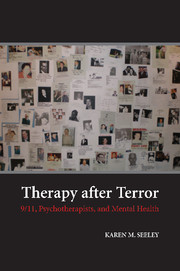Book contents
- Frontmatter
- Contents
- Acknowledgments
- Introduction
- 1 Trauma Histories
- 2 Volunteers for America
- 3 “Get Me Counselors!”
- 4 The Psychological Treatment of Trauma
- 5 The Trauma of Psychological Treatment
- 6 Diagnosing Posttraumatic Stress Disorder
- 7 Trauma as Metaphor
- 8 Mental Health in Traumatic Times
- Notes
- Works Cited
- Index
3 - “Get Me Counselors!”
Published online by Cambridge University Press: 05 August 2012
- Frontmatter
- Contents
- Acknowledgments
- Introduction
- 1 Trauma Histories
- 2 Volunteers for America
- 3 “Get Me Counselors!”
- 4 The Psychological Treatment of Trauma
- 5 The Trauma of Psychological Treatment
- 6 Diagnosing Posttraumatic Stress Disorder
- 7 Trauma as Metaphor
- 8 Mental Health in Traumatic Times
- Notes
- Works Cited
- Index
Summary
PSYCHOLOGICAL FIRST AID
While thousands of mental health professionals sought volunteer assignments through the Red Cross, numerous metropolitan area therapists realized that they could not rely on traditional relief organizations to find them places to volunteer. Whether they were put off by the disorganization of the initial mental health response, or whether they lacked the necessary state licenses to be accepted as Red Cross volunteers, they sought other ways to provide psychological assistance after the World Trade Center attack. Without an overarching plan to guide them, therapists had no choice but to improvise. Many struck out on their own, manifesting an open, inclusive, and entrepreneurial spirit notably different in tone from their customary privacy and exclusivity. A few therapists set up tables on the sidewalks of their Brooklyn neighborhood, handing out literature on trauma and referring passersby in need to psychological treatment. A psychoanalytic institute that, like many others in the city, normally hid itself from view, its small sign barely visible from the street, opened its doors to the public; its free group therapy sessions were advertised on television. Some therapists were revitalized when they reached out in unconventional ways – it took them back to their professional roots. One felt as if “it was 1890, and you were a charitable organization social worker, and you had to go door to door … we were out there.”
While therapists were searching for ways to help, the demand for their services grew.
- Type
- Chapter
- Information
- Therapy after Terror9/11, Psychotherapists, and Mental Health, pp. 61 - 79Publisher: Cambridge University PressPrint publication year: 2008



